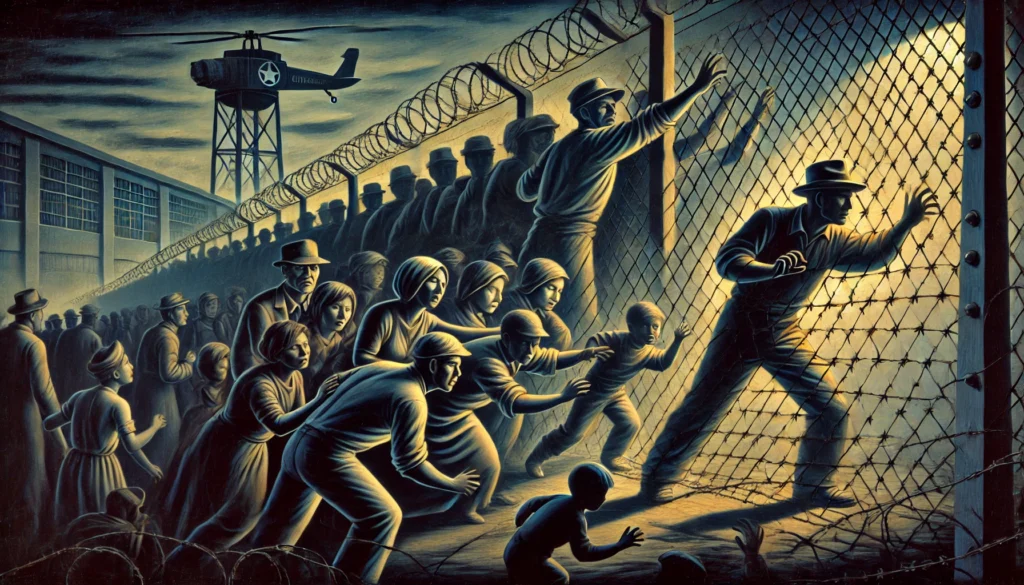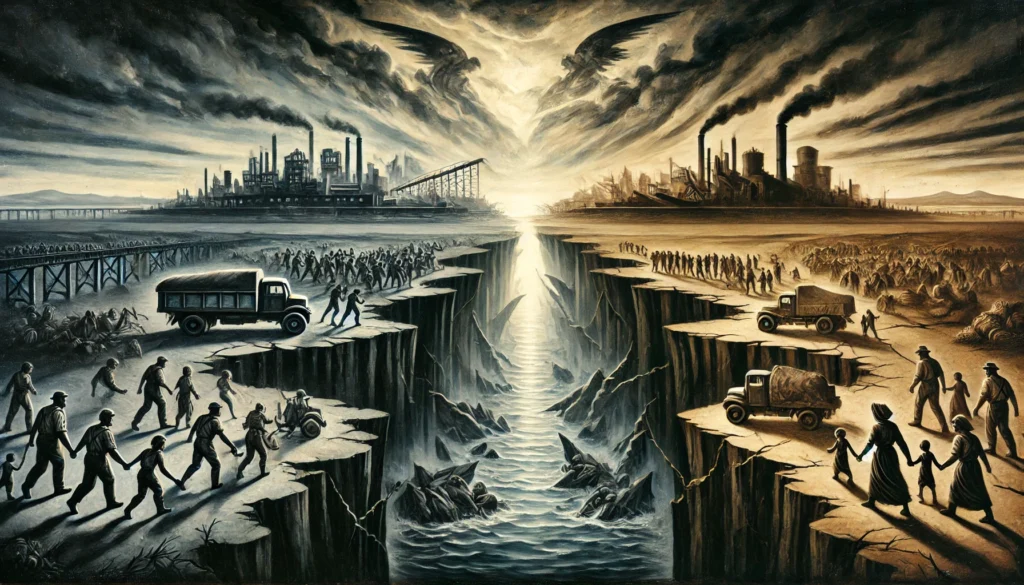Many of us know people who have come to the United States in search of a better life, and some have found a place within our communities despite being undocumented. Often, these individuals take on jobs that are essential but undervalued—harvesting crops, cleaning homes, and building our cities. Beyond these visible roles, there is a larger, often hidden population of undocumented workers whose labor supports many sectors of our economy, all while being denied a clear or fair path to citizenship. The current political climate, spearheaded by figures like Donald Trump, calls for sweeping measures to deport these individuals en masse. But what would be the real cost of such actions—not just economically but morally and socially?
To understand the potential consequences, we must first look to history and draw lessons from times when governments pursued similar exclusionary and divisive policies. Moreover, we must explore the practical and logistical challenges of rounding up millions of undocumented individuals in today’s world, and how this could reverberate through our economy and society.

The Historical Parallels: Learning from the Past
Throughout history, societies have turned to scapegoating vulnerable populations during times of economic hardship or political instability. One of the clearest and most harrowing examples is Nazi Germany in the 1930s. Adolf Hitler and the Nazi regime gained traction by vilifying Jews, Roma people, and other minorities, blaming them for Germany’s post-World War I economic struggles. This “othering” was not just a political tool but also a method to unite the majority under a common enemy.
The propaganda used by the Nazi regime dehumanized Jews, portraying them as the root of societal problems. This systematic marginalization made it easier to justify increasingly extreme measures, which culminated in the Holocaust. While the scale and horror of that era stand apart, the underlying mechanisms—fear-mongering, the demonization of outsiders, and the exploitation of economic fears—are disturbingly similar to what we see in today’s political rhetoric surrounding undocumented immigrants.
The mass deportation rhetoric of today also echoes the exclusionary policies of 20th-century fascist regimes in Italy and Spain, where minority groups were targeted under the guise of national purity and social cohesion. In each case, the narrative of national decline was tied to the presence of “outsiders,” and the solution proposed was to purge society of these elements. While the methods and outcomes varied, the moral costs were devastating, leading to decades of oppression, war, and loss of human life.
In the U.S., we have a more recent parallel: the mass deportation of Mexican immigrants in the 1930s during the Great Depression. This period saw the forced removal of approximately 1.8 million people, many of whom were U.S. citizens or legal residents of Mexican descent. The policy aimed to “free up jobs” for American citizens, but the impact was disastrous. Families were torn apart, and communities were devastated. History shows that such actions not only failed to solve the economic problems but left deep scars on the social fabric of the nation.
These examples serve as warnings. Policies driven by fear and exclusion rarely lead to long-term prosperity. Instead, they foster division, resentment, and often violence. Today, we are at a similar crossroads, and we must decide whether we will learn from the past or repeat its mistakes.
The Logistics of Mass Deportation: A Complex Challenge
Beyond the moral implications, there are significant logistical challenges to consider when discussing the mass deportation of undocumented individuals. Estimates suggest there are around 10 to 12 million undocumented immigrants living in the United States today. The idea of rounding up and deporting such a vast number of people presents an unprecedented logistical challenge, with far-reaching consequences for both the economy and society.
1. The Economic Impact:
Undocumented immigrants contribute significantly to various sectors of the economy, particularly in industries like agriculture, construction, hospitality, and healthcare. These sectors rely heavily on immigrant labor to function. For example, according to the American Farm Bureau, over half of the agricultural workforce is made up of undocumented workers. Removing this workforce en masse would likely lead to severe labor shortages, causing disruptions in food production, rising prices, and an increased dependency on foreign imports.
In construction, undocumented workers fill a crucial gap, particularly in low-wage, high-labor sectors. The removal of this labor force could stall infrastructure projects, slow down the housing market, and lead to increased costs for consumers. Moreover, industries such as hospitality, healthcare, and even technology rely on immigrant labor to support growth and innovation. The ripple effect of mass deportations would likely destabilize many of these industries, leading to economic downturns and higher unemployment rates for all workers, not just immigrants.
2. The Cost of Deportation:
The financial cost of deporting millions of people would be staggering. A 2017 report from the Center for American Progress estimated that the cost of deporting all undocumented immigrants would exceed $100 billion, not including the long-term economic losses mentioned above. This figure includes the cost of identifying, detaining, and processing individuals, as well as the legal proceedings necessary to carry out such actions. Furthermore, the social cost—both in terms of human suffering and the strain on government resources—would be immeasurable.
3. Social and Political Consequences:
Deporting millions of individuals would also raise significant social and political challenges. The U.S. prides itself on being a nation of immigrants, and many undocumented individuals have deep roots in their communities. Families would be torn apart, children (many of whom are U.S. citizens) would be left without parents, and entire neighborhoods would be destabilized. The social upheaval caused by such a policy could lead to increased crime, social unrest, and a further erosion of trust between immigrant communities and law enforcement.
Moreover, the political backlash could be substantial. The U.S. is already divided on the issue of immigration, and a mass deportation campaign could exacerbate tensions, leading to greater polarization and possibly violent confrontations. Politically, such a move might alienate key voting blocs, including Latinos and other minority groups, further fragmenting the national political landscape.

A Path Forward: Comprehensive Immigration Reform
While mass deportation may seem like a solution to some, the reality is that it would create far more problems than it solves. History teaches us that exclusionary policies not only fail to address the root causes of societal challenges but often make things worse. Instead of mass deportation, we should focus on comprehensive immigration reform that acknowledges the contributions of undocumented workers while providing a fair and attainable path to citizenship.
Such reform would require bipartisan cooperation and a commitment to humane and effective solutions. This includes creating avenues for undocumented individuals to come out of the shadows, regularizing their status, and ensuring that they are protected from exploitation. By doing so, we can strengthen the economy, bolster social cohesion, and stay true to the values that have made the U.S. a beacon of hope for so many.
Conclusion: Learning from the Past to Shape the Future
The current debate around immigration in the United States is not just about economics or national security. At its core, it is a moral question—one that challenges us to reflect on who we are as a nation and how we treat those who come seeking a better life. History has shown us the dangers of policies driven by fear and exclusion. If we fail to learn from these lessons, we risk repeating the mistakes of the past with devastating consequences.
The logistical and moral costs of mass deportation are too high. Instead, we must focus on comprehensive solutions that honor the contributions of immigrants, protect human rights, and build a future rooted in justice, empathy, and shared prosperity.




